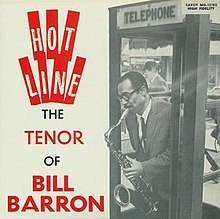Despite the title, this song doesn't have much to do with Jelly Roll Morton. It's a funky number with a boogaloo-like groove. The melody is simple and spare with a lot of open space, resulting in a rather ominous sound which is further accentuated by the bass line: a steady eighth-note pattern accentuating the tritone of F and B. This bass line runs through the whole song; on the recording, the piano doubles the bass throughout and never comps, which is why the changes in the head are written in parentheses.
The entire melody is in the blues scale, and the form is almost a blues—but not quite! Six measures of the I chord are followed by four measures of IV and two more of I. The B section, taking the place of a turnaround, is a four-measure stop-time passage on the V chord. The form of the head is ABA, but the solos are on AB without the repeated A section (D and E on the lead sheet). On the recording, the melody over the stop-time E section is played every time: both within and between the solos.
Only the two saxes solo on the recording; rhythm section soloists doing this song could play the stop-time melody themselves or have the horns play. Alternatively, the soloist can continue to improvise over the stop-time without the written melody. The E section melody extends to the downbeat of the next solo chorus; in our lead sheet we show the note here with the words "tacet note 1st time", since the only time it is not played is the first solo chorus. We also show this note at the beginning of the head, indicated "play on D.C. only"; it is not part of the in head.
Because the blues scale is so important in this song, we show alternate chord qualities below the staff in the solo section. These are dominant chords with a sharp 9th and sharp 11th—the same notes as the minor 3rd and flat 5th of the blues scale.
We have made a Rhythm Section part to highlight not only the bass line but the unique drum part, which implies a double-time feel while retaining a single-time backbeat. The rhythms of the melody are written above the staff.
On the
album, this song's title is given as
Jelly Roll, which may have caused some confusion with the Charles Mingus song of the same title. That Mingus song was recorded twice with Booker Ervin, one of these as a variation titled
My Jelly Roll Soul. Jelly Roll Twist is an equally effective vehicle for Booker, whose expansive and precise sound is instantly recognizable. There are no other known recordings of this Bill Barron song; by making it available, we hope we will inspire some in the near future.


